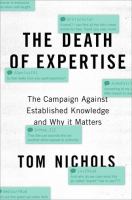The other was Donald Trump who expressed a disdain for experts. He once said "I love the poorly educated." many of whom felt put down by elites. A consequence of his success is the disparagement of proven expert and true public servant Dr. Anthony Fauci and the deaths of thousands of Americans (and beyond).
The author hopes "this would contribute to bridging the rift between experts and lay people that in the long run threatens not only the well being of millions of Americans, but also the survival of our democratic experience."
As civilization has advanced we have increasingly specialized. No one has the time to be an expert on more than a very few topics, yet we rely on experts to navigate the many complications of modern life. Are experts always right?--not according to the author, but respecting them is important to making better decisions.
Despite a supposedly more educated population an increasing problem seems to be confirmation bias, i.e. seeking information of that we already accept as truth. Jonathan Haidt is quoted "When facts collide with personal values almost every one finds a way to stick with their values and reject the evidence." Check http://www.therealjohndavidson.com/2013/02/the-righteous-mind.html
A quote from the preface, "Writing a book can be a wonderful and engaging experience for the author, but less so for the people around him."
At the time of the Iranian hostage crisis, ABC decided to offer longer coverage and set up "Nightline" which turned out to be so popular that it encouraged 24 hour news service. Radio was supposedly a thing of the past, but it proved a great platform for right wing talk hosts of which Rush Limbaugh was a successful example. While most Americans had gotten their news from 3 or 5 networks and us Canadians with an additional 2, that all exploded with cable tv. First CNN came up with the 24 hour format and they quickly learned controversy helped attract viewers. A few years later Fox news came on and took a partisan slant on the news and realized being entertaining was critical. Ronald Reagan did away with the Fairness Doctrine and it seemed to give a license to report news in a partisan manner.
To protect yourself the author suggests: Be humble and assume the writer knows more than you. Be ecumenical and vary your sources. Be less cynical and allow that most experts are not trying to lie. Be more discriminating asking if they are politically affiliated, do they have editors, are their claims checkable?
In the process of reading, a few of my personal beliefs are challenged. GMOs (genetically modified organisms) are generally thought to be bad, although a Facebook friend of mine, Jim Weeden with agricultural experience and academic once assured me that GMO's are unproven to be bad. The author assures that the majority of scientists feel they are not bad. He also attacks Wikipedia which I use a lot, but assures me their film synopses are useful.
Bloggers are deemed one of the culprits. I plead guilty, but do my best to give accurate information (corrections are welcome), but two other motivations are behind my efforts 1). to remember and 2) to deliver my opinion. Getting correct information is needed to form useful opinions and to properly remember accurately what I want to recall.
As I was drafting this blog I chanced upon "The Great Hack" (2019) which helps explains the role of Cambridge Analytica in both the Brexit referendum and the Trump election victory in 2016. Basically they were able to use data that allowed them to determine where most effective to focus misinformation. or ways to inflame fears and hate. Implicated Facebook for using information gathered from their popular social media platform. http://www.therealjohndavidson.com/2022/07/the-great-hack-reveals-vulnearability.html
In the end we have to trust who to believe.

No comments:
Post a Comment